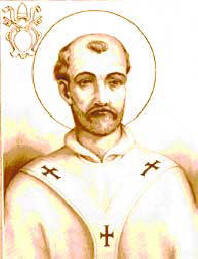 Pelagius II was a Roman, but his father had a German name, Winigild.
When
Pelagius was elected pope, the Lombards were blockading Rome, making it
impossible to send for the imperial confirmation of the election. After an
interval of four months Pelagius was consecrated without the imperial
confirmation. Once pope, Pelagius succeeded in getting the Lombards to
raise the siege. He then sent an embassy to Constantinople to inform the
Emperor of his election and to get help. As usual, the plea brought back
little but words from the palace on the Golden Horn. Later the Emperor
Maurice sent a new official with the title of exarch to handle both
military and civil government for the Emperor.
Pelagius II was a Roman, but his father had a German name, Winigild.
When
Pelagius was elected pope, the Lombards were blockading Rome, making it
impossible to send for the imperial confirmation of the election. After an
interval of four months Pelagius was consecrated without the imperial
confirmation. Once pope, Pelagius succeeded in getting the Lombards to
raise the siege. He then sent an embassy to Constantinople to inform the
Emperor of his election and to get help. As usual, the plea brought back
little but words from the palace on the Golden Horn. Later the Emperor
Maurice sent a new official with the title of exarch to handle both
military and civil government for the Emperor.
Disappointed with Constantinople, Pope Pelagius turned to the Franks. He
wrote to Aunacharius, bishop of Auxerre, pleading with him to use his
influence with the Frankish kings to come down and help poor Italy. The
emperor added his pleas to those of the Pope, and the Franks did move an
army down into the peninsula. But Lombard gold soon turned back the
brave
Franks and nothing was accomplished.
While his ambassador, the great Gregory, continued to bombard the
Emperor
with appeals. Pelagius himself asked Decius the exarch to protect Rome.
Decius pathetically replied that it was all he could do to protect Ravenna.
But at last the exarch did manage to get a truce with the wild men, and for
a short spell Italy was at peace.
Pelagius took advantage of this breathing spell to try to bring the Three
Chapters schism to an end. Back in the time of Pope Vigilius Northern Italy
had revolted from the Holy See over the Three Chapters. Milan and Genoa
had
returned to Catholic unity but Northeastern Italy, led by the archbishop of
Grado, remained stubborn. Actually this schism had begun at Aquileia, but
the Lombards had sent Bishop and people scurrying to the island of Grado
for safety. To these people Pelagius wrote letter after letter pleading
with them to return to Catholic unity. It was no use. Poorly educated, they
could ill understand the Pope's arguments and they remained stubborn in
their schism.
The exarch Smaragdus now put pressure on them. At the Pope's request he
ordered them at least to attend a council at Ravenna. When nothing came of
this, the exarch bluntly ordered Archbishop Severus to enter into
communion
with the orthodox archbishop of Ravenna. Though Severus obeyed, once
out of
the exarch's clutches he quickly went back into schism. The schism dragged
on, despite the efforts of Pope Pelagius II.
Pelagius worked zealously to foster celibacy among the Western clergy. He
adorned St. Peter's and rebuilt St. Lawrence's. A charitable soul, he
turned his own house into a hospital. His charity was needed, for at this
time Rome was devastated by a great flood.
Pelagius II died, the victim of a plague, February 7, 590.
Excerpted from "Popes
Through the Ages" by Joseph Brusher, S.J.

